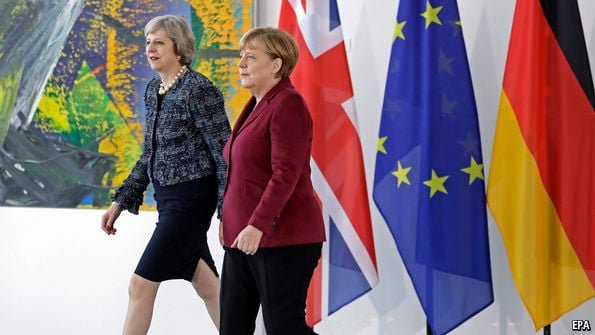By BAGEHOT | BERLIN
“MARK my words. Within a year she’ll be gone. She’s stuffed.” Thus a senior Cameroon surveyed the landscape almost exactly a year—and what feels like many political ages—ago over dinner. He was talking of Angela Merkel, whose handling of the refugee crisis 10 Downing Street considered suicidal. Surely, the thinking went, no leader could accept the arrival and settlement of so many newcomers and survive? The bafflement betrayed the British government’s poor grasp of the differences between its electorate and political system, and those of Germany. Indeed, today it is Mr Cameron who is “stuffed” and “gone” while Angela Merkel cruises, albeit through choppy waters, to a fourth term as chancellor.
The incident underlines one of the sad if perennial features of Anglo-German relations: mutual incomprehension. Sad, because the two countries share so much, in interests and outlook. And perennial because their political cultures are so alien to one another.
The German establishment simply does not understand Britain’s island mentality, and the complex, post-imperial blend of arrogance and insecurity that defines its stance towards the outside world (which I discuss in my latest column, on the transatlantic relationship). Britons, meanwhile, struggle with Germany’s equally distinctive sense of belonging and duty as the linchpin of the European order. The gap is even borne out in the architectures of the two polities. Westminster is a festival of Victoriana, a neo-Gothic reminder of Britain’s past hegemony and Blitz-era defiance. Berlin’s government quarter around the Reichstag has mostly risen in the past twenty years; all buildings rebuilt from, or built on, the ruins of extremism. Its very streets are studded with stumbling blocksor brass cobblestones marking the victims of Nazism at the addresses where they once lived.
The context of Theresa May’s meeting with Mrs Merkel today in Berlin illustrated how little has changed since that dinner in London some 12 months ago. Britain may have voted to leave the EU and acquired a new prime minister, but still that mutual incomprehension reigns. Many German leaders suspect that the British political class is looking for excuses to kill Brexit. They fret that opening Europe’s patchy “four freedoms” (people, capital, services, goods) to negotiation could bring down the union; “cherry picking” (or “raisin picking” as they say here) being the ultimate crime. Meanwhile their British counterparts have long treated the vote to leave the EU as unquestionable. And they consider that very patchiness a case for a everyone has their taste sort of European future; not only do they want to pick the cherries/raisins, but they think the act of doing so good for Europe.
This gulf is reflected in recent headlines. Wolfgang Schäuble’s recent interview with the Financial Times—in which the German finance minister rejected talk of an à-la-carte Brexit, appears in today’s German press as a moderating intervention in pursuit of a European consensus. In the British press it is claimed that he is spoiling for a fight (“READY TO PLAY HARD BALL” reads one headline). Meanwhile, Britain’s recent appearances in the German media are not flattering. Boris Johnson is mocked for suggesting that Italy’s prosecco sales could suffer if Italy does not back a generous Brexit deal. Jeroen Dijsselbloem, the Dutch finance minister, is widely quoted calling Britain’s demands “intellectually impossible”.
Many in London are fatalistic about this sort of thing. Some pro-Europeans believe Britain will get a terrible deal that will do it much harm. Some Brexiteers reckon Europe has no choice but to fall at Britain’s feet. While the former group is closer to the truth, neither has it quite right: there is plenty to fight for. In Brussels a tug-of-war is taking place between federalists who want a hermetic Brexit agreement and Anglophiles who want one incorporating a transitional deal that might guide Britain towards some sort of associate membership. Which prevails—and thus what role Britain plays in Europe’s future—partly depends on the expansion of the pool of mutual assumptions, hopes and priorities uniting London and Berlin. Today’s encounter between Mrs Merkel and Mrs May was awkward and stilted, which may be natural at a time when the latter is new and the former more concerned with America. But it must not remain that way.




